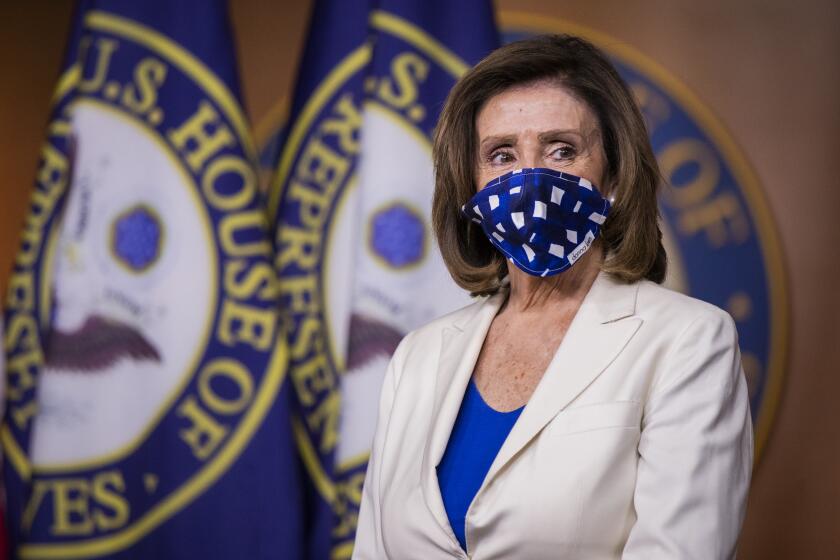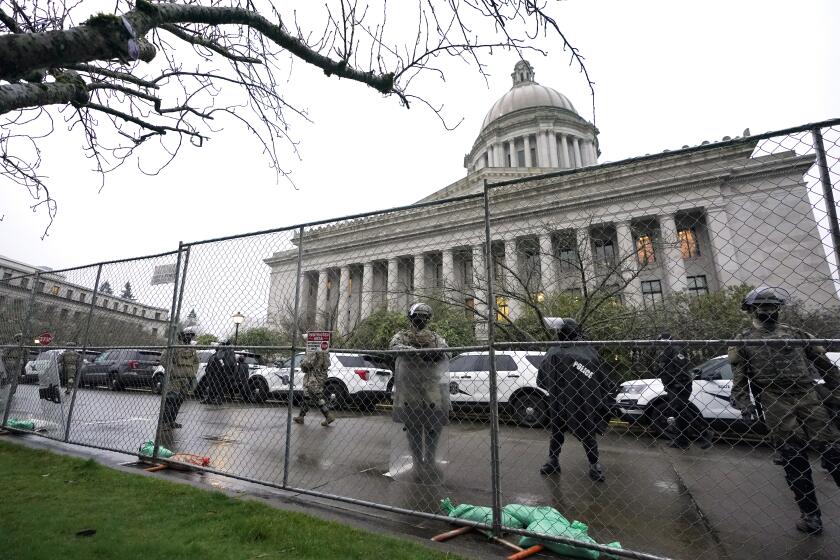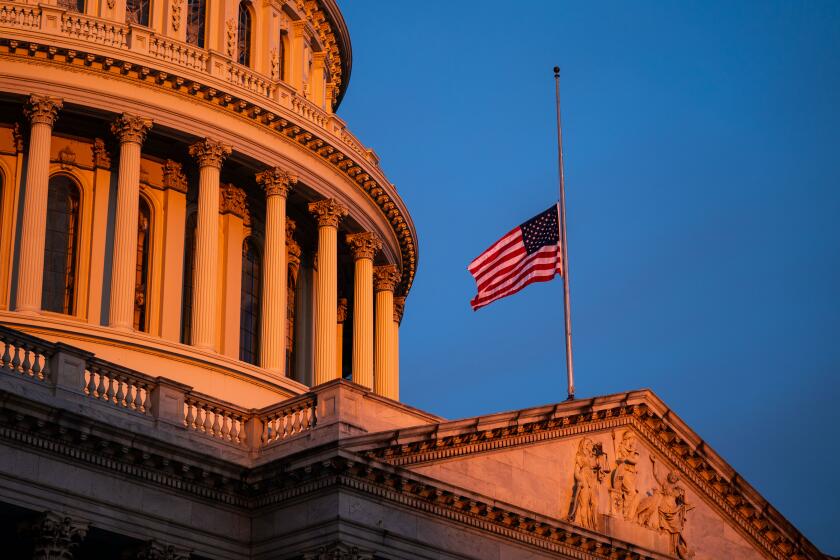Democrats balance impeachment with Biden’s first 100 days as clock ticks toward Trump exit

House leaders set plans in motion to impeach President Trump for a second time, with a vote as early as Wednesday, as President-elect Joe Biden and congressional leaders huddled over how to carry out a Senate trial later this month without derailing the new administration’s agenda.
The discussions highlighted the urgent but tricky task facing Democrats as they prepare to take power next week: how to hold Trump accountable for his role in inciting last week’s mob invasion of the Capitol while simultaneously launching Biden’s new administration in the midst of a public health and economic crisis, with a continued threat of violence.
Democrats said they’re confident they have the votes needed to pass the article of impeachment introduced Monday by Reps. David Cicilline (D-R.I.), Ted Lieu (D-Torrance) and Jamie Raskin (D-Md.). It has only one charge: incitement of insurrection.
“Donald John Trump engaged in high Crimes and Misdemeanors by willfully inciting violence against the Government of the United States,” the article reads. “He threatened the integrity of the democratic system, interfered with the peaceful transition of power, and imperiled a coequal branch of Government. He thereby betrayed his trust as President, to the manifest injury of the people of the United States.”
With 213 Democratic House members signing on as cosponsors by Monday morning and more promising to vote for it, impeachment is assured. “We now have the votes to impeach,” Cicilline said on Twitter.
Here are leading scenarios as Congress weighs punishing Trump for inciting violence: resignation, 25th Amendment, impeachment, censure, 14th Amendment, no action.
A few GOP members, including Reps. Adam Kinzinger of Illinois and Peter Meijer of Michigan, have indicated they’re considering removing the president from office. Others have blasted the Democrats’ effort as divisive.
“We must come together to heal our nation, but House Democrats’ latest attempts to remove the president from office will further divide us,” said Rep. Tom Emmer (R-Minn.), chairman of the House Republican campaign arm. “It is a politically motivated effort by [Speaker] Nancy Pelosi and House Democrats that will fracture our nation even more instead of bringing us together.”
Prospects for a Senate trial, however, are far less clear. Majority Leader Mitch McConnell (R-Ky.) told fellow senators last week that under the chamber’s rules, starting a trial before the inauguration would require unanimous agreement, a near impossibility.
Sen. Charles E. Schumer (D-N.Y.), who will become majority leader on Jan. 20, is exploring whether to use emergency powers to reconvene the Senate to allow for a trial to begin immediately after the impeachment article is sent to the Senate.
Under an emergency rule approved after the Sept. 11, 2001, terrorist attacks, the top two leaders — currently Schumer and McConnell — can approve reopening the Senate. While McConnell is unlikely to go along, the move would increase the pressure on him to do so.
Even if Trump already has left office, a conviction could lead to his being barred from running again, although that would require a second Senate vote. Several Senate Republicans have spoken out in anger at Trump’s role in last week’s violence. A trial held after Trump leaves office could mitigate GOP concerns about removing a duly elected president from office. But how many of them would join Democrats in voting to convict Trump remains unknown.
The problem for Biden is that those proceedings will take time. Already he seems likely to take office without his top Cabinet officials confirmed, breaking a decades-long tradition of getting at least some top national security officials in place from the opening moments of a new administration. Republicans, who will continue to chair Senate committees until the Democrats take the majority on Inauguration Day, have not scheduled hearings for the vast majority of Biden’s nominees.
On Friday, Biden expressed concern that a Senate trial could interfere with confirming his nominees and moving forward on the new COVID-19 relief and economic stimulus package he plans. Over the weekend, one of his closest congressional allies, Rep. James E. Clyburn (D-S.C.), floated the idea that if the House impeached Trump, Pelosi (D-San Francisco) could wait 100 days to send the impeachment resolution to the Senate for trial in order to clear the way for Biden’s priorities.
That drew strong opposition from other House Democrats, and on Monday, Biden publicly backed away from it.
This will look like no other presidential impeachment in U.S. history. Here’s what we know about what the next few days and weeks could look like.
House Democrats said any talk of delay undermined their argument that Trump’s continued presence — along with the possibility of further violence by his supporters — posed a continuing threat.
“This man is a danger every day that he remains in office,” Rep. Adam B. Schiff (D-Burbank) said on “CBS This Morning,” in comments reflecting the House leadership’s position.
The impeachment resolution “should be immediately transmitted to the Senate,” said Schiff, who led the previous impeachment effort in 2019-20. If the Senate doesn’t act, “then it’s on them what this president may do between now and Inauguration Day, but I don’t want that on my conscience.”
State Capitols across the country are under heightened security after the siege of the U.S. Capitol last week.
Underscoring the concerns, the National Park Service said it would close the Washington Monument for two weeks starting Monday and might close other areas because of potential security threats between now and the inauguration on Jan. 20. The FBI warned law enforcement agencies of the possibility that right-wing groups might stage further demonstrations in Washington or state capitals.
The Homeland Security Department announced Monday that heightened security for the inaugural would begin Wednesday rather than next week as planned. Not long after, it was announced that acting Homeland Secretary Chad Wolf was stepping down.
Five people died in Wednesday’s attack on the Capitol, including a Trump supporter who was shot by an officer while she took part in trying to break down the door of the House chamber and a Capitol Police officer who was reportedly clubbed with a fire extinguisher during a confrontation with the mob.
The attack delayed for several hours Congress’ formal counting of electoral votes that confirmed Biden’s victory.
Biden said that he and congressional leaders had discussed a plan under which the Senate could split its day, spending a “half day on dealing with the impeachment and half day getting my people nominated and confirmed in the Senate as well as moving on the [relief] package.”
“My priority is to get — first the stimulus bill passed and secondly begin to rebuild the economy,” he told reporters in Newark, Del., after he received his second COVID-19 vaccine shot.
At the same time, he said, “I think it’s critically important that there be a real, serious focus on holding those folks who engaged in sedition and threatened people’s lives, and defaced public property, caused great damage — that they be held accountable. That’s a view that’s held by the vast majority of Democrats and Republicans in the Congress,” he said.
Three members of the House of Representatives introduced the article of impeachment, citing the president’s role in ‘incitement of insurrection.’
Earlier in the day, House Republicans blocked Democrats from enacting a resolution calling on Vice President Mike Pence to use the 25th Amendment to remove Trump.
Rep. Alex Mooney (R-W.Va.) objected to the Democrats’ attempt to fast-track the resolution. Shortly afterward, Pelosi called House members back to Washington for a vote on the measure scheduled for Tuesday evening.
Mooney, in a statement, said he opposed enacting the measure without any debate but didn’t say whether he opposed the idea of trying to remove the president.
Though the resolution does not bind Pence, Democrats hope it will ramp up pressure on the vice president and House Republicans to use the amendment, for which they have so far shown little appetite.
“We have a president who most of us believe participated in encouraging an insurrection and attack on this building, and on democracy, and tried to subvert the counting of the presidential ballot,” said House Majority Leader Steny H. Hoyer (D-Md.).
The 25th Amendment lays out the procedure for removing a president who is unfit or incapacitated. The House resolution calls on Pence and Trump’s Cabinet to use the amendment “to declare what is obvious to a horrified nation: That the president is unable to successfully discharge the duties and powers of his office.”
If Pence does not invoke the amendment, Democrats say they will hold a vote on impeachment.
It would be the second impeachment of Trump, following one in 2019 over his pressuring of Ukrainian government officials to investigate Biden. No American president has ever been impeached twice.
More to Read
Get the L.A. Times Politics newsletter
Deeply reported insights into legislation, politics and policy from Sacramento, Washington and beyond. In your inbox three times per week.
You may occasionally receive promotional content from the Los Angeles Times.












